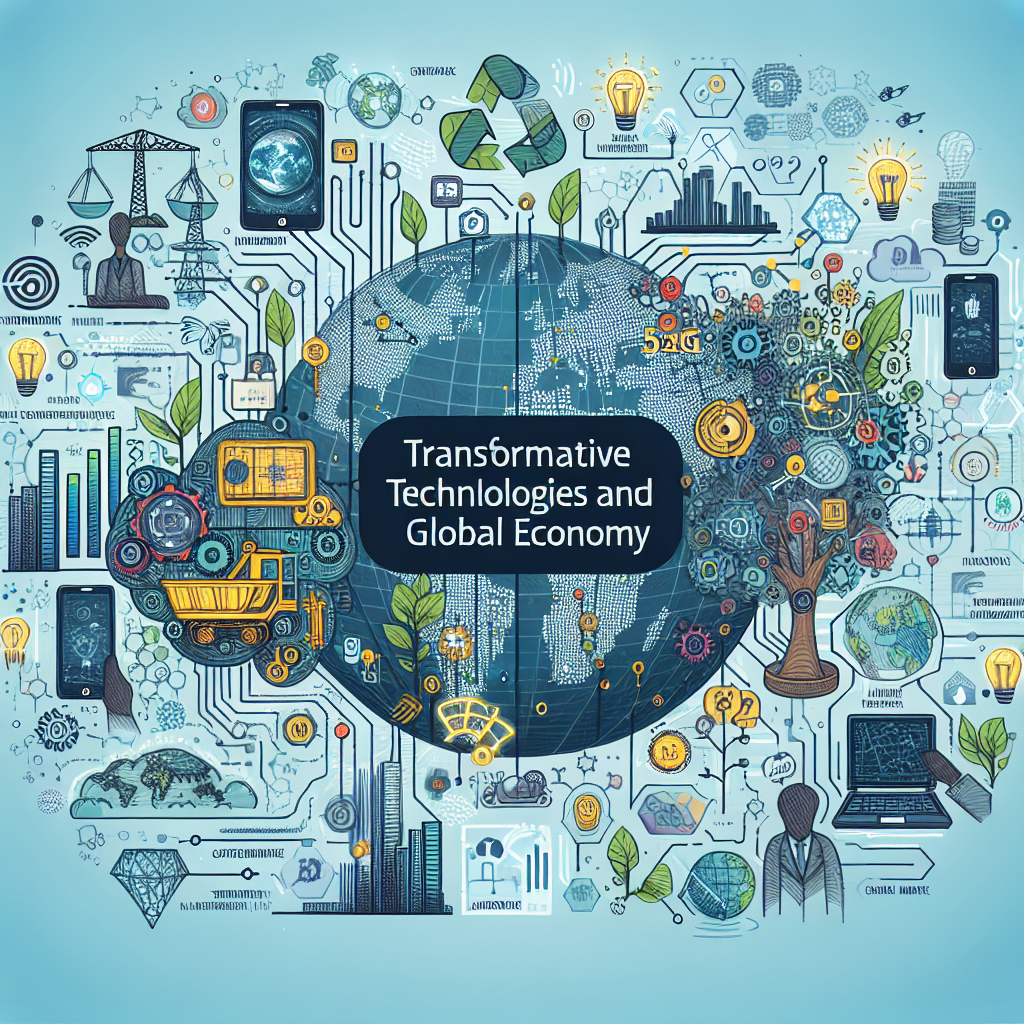In today’s fast-paced world, transformative technologies are drastically reshaping the global economy. These groundbreaking advancements, such as artificial intelligence, blockchain, and the Internet of Things, have revolutionized industries and business models, creating new opportunities and challenges for economies around the world. The integration of these technologies has led to increased efficiency, productivity, and global interconnectedness, driving economic growth and innovation on a global scale. As businesses and governments embrace these transformative technologies, the landscape of the global economy continues to evolve, opening doors to endless possibilities and transforming the way we live, work, and interact in the digital age.
Understanding Transformative Technologies
-
Definition of Transformative Technologies
Transformative technologies refer to innovations that have the potential to significantly alter existing processes, systems, or industries, leading to substantial advancements in efficiency, productivity, and capabilities. These technologies often disrupt traditional business models and practices, reshaping the way we live, work, and interact with the world around us.
-
Examples of Transformative Technologies
-
Quantum Computing
Quantum computing harnesses the principles of quantum mechanics to perform complex calculations at speeds exponentially faster than classical computers. By leveraging quantum bits or qubits, which can exist in multiple states simultaneously, quantum computers have the potential to revolutionize fields such as cryptography, drug discovery, and optimization problems that are currently intractable for classical computers. -
Artificial Intelligence
Artificial intelligence (AI) involves the development of intelligent systems that can learn, reason, and act autonomously. Through techniques like machine learning and neural networks, AI applications have transformed industries ranging from healthcare and finance to transportation and manufacturing. AI-powered technologies enable predictive analytics, natural language processing, and computer vision, driving innovation and efficiency across various sectors. -
Blockchain
Blockchain technology facilitates secure, transparent, and decentralized transactions through a distributed ledger system. Originally developed for cryptocurrencies like Bitcoin, blockchain has expanded its use cases to include supply chain management, smart contracts, and digital identity verification. By eliminating the need for intermediaries and enhancing data integrity, blockchain has the potential to streamline processes, reduce fraud, and increase trust in transactions on a global scale.
Impact of Transformative Technologies on the Global Economy
The impact of transformative technologies on the global economy has been profound and far-reaching, reshaping industries, job markets, and competitive landscapes.
- Disruption of Traditional Industries
- Automotive: The automotive industry has been significantly disrupted by transformative technologies such as electric vehicles, autonomous driving systems, and shared mobility services. Traditional automakers are facing increasing competition from tech companies and new entrants in the market.
- Healthcare: Transformative technologies like telemedicine, wearable devices, and artificial intelligence are revolutionizing healthcare delivery and patient care. This has led to improved efficiency, personalized treatments, and remote monitoring capabilities.
-
Finance: Fintech innovations such as blockchain, robo-advisors, and digital payment systems have disrupted traditional banking and financial services. This has created new opportunities for financial inclusion, streamlined processes, and enhanced security in transactions.
-
Job Displacement vs. Job Creation
-
The adoption of transformative technologies has led to concerns about job displacement in certain sectors where automation and AI have replaced human labor. However, these technologies have also created new job opportunities in fields such as data analytics, cybersecurity, and software development.
-
Global Connectivity and Market Expansion
-
Transformative technologies have facilitated global connectivity through the internet, cloud computing, and digital platforms. This has enabled businesses to reach new markets, collaborate across borders, and access a global talent pool. E-commerce platforms have also expanded market reach for small and medium enterprises, leveling the playing field with larger corporations.
-
Innovation and Competitiveness
- The rapid pace of technological innovation has become a key driver of competitiveness in the global economy. Companies that embrace and leverage transformative technologies are able to improve operational efficiency, enhance product offerings, and adapt to changing consumer demands more effectively. Innovation ecosystems have emerged in tech hubs around the world, fostering collaboration between startups, corporations, and research institutions to drive economic growth and technological advancement.
Challenges and Opportunities in the Integration of Transformative Technologies

Regulatory Hurdles
- Regulatory challenges represent a significant barrier to the seamless integration of transformative technologies into the global economy.
- Differing regulatory frameworks across countries can lead to inconsistencies in the application and enforcement of laws related to emerging technologies.
- Lack of harmonization in regulations pertaining to areas such as artificial intelligence, blockchain, and autonomous vehicles can hinder cross-border innovation and investment.
- Opportunities for collaboration exist in creating international standards and agreements to address regulatory challenges and foster a more conducive environment for technological advancements.
Skill Gap and Workforce Training
- The rapid pace of technological advancement has resulted in a growing gap between the skills required by the workforce and those possessed by existing employees.
- Training programs that focus on upskilling and reskilling workers in areas such as data science, cybersecurity, and digital marketing are essential to bridge this gap.
- Investment in continuous learning and professional development can help employees adapt to the changing technological landscape and remain competitive in the global economy.
- Collaboration between industry and educational institutions is key to ensuring that the workforce is equipped with the necessary skills to leverage transformative technologies effectively.
Ethical Considerations
- As transformative technologies continue to evolve, ethical considerations surrounding their use become increasingly important.
- Issues related to privacy, bias, and accountability must be addressed to ensure that technological advancements are made in a responsible and ethical manner.
- Frameworks for ethical decision-making in the development and deployment of technologies such as artificial intelligence and biotechnology are essential to mitigate potential risks.
- Engagement with stakeholders including policymakers, industry leaders, and the public is crucial in shaping ethical guidelines that govern the integration of transformative technologies in the global economy.
Environmental Sustainability
- The impact of transformative technologies on the environment is a critical consideration in their integration into the global economy.
- Technological innovations that promote sustainability, such as renewable energy solutions and smart resource management systems, can contribute to a more environmentally conscious economy.
- Mitigating the carbon footprint of emerging technologies through green practices and policies is essential to minimize negative environmental effects.
- Collaboration between technology companies, policymakers, and environmental organizations is necessary to ensure that transformative technologies support rather than undermine global sustainability goals.
The Role of Governments and International Organizations
Governments and international organizations play a crucial role in shaping the interaction between transformative technologies and the global economy. By implementing policies and initiatives, they can influence technological adoption, foster collaborations, address inequalities, and ensure fair trade practices related to intellectual property rights. Here are some key aspects of their involvement:
- Policies and Incentives for Technological Adoption
Governments can create a conducive environment for the adoption of transformative technologies by offering incentives such as tax breaks, grants, and subsidies to businesses and industries. Additionally, they can establish regulatory frameworks that encourage innovation and investment in emerging technologies.
- Collaborations and Partnerships
International organizations facilitate collaborations among countries, research institutions, and private sector entities to promote the development and deployment of transformative technologies. By fostering partnerships, governments can leverage expertise and resources to accelerate technological advancements and address global challenges.
- Addressing Global Inequalities
Governments and international organizations play a vital role in addressing disparities in technological access and adoption across different regions and socioeconomic groups. By investing in digital infrastructure, promoting digital literacy, and supporting technology transfer programs, they can reduce inequalities and ensure that the benefits of transformative technologies are equitably distributed.
- Trade Agreements and Intellectual Property Rights
Trade agreements negotiated by governments often include provisions related to intellectual property rights, particularly in the context of transformative technologies. By safeguarding intellectual property, governments can incentivize innovation and protect the interests of businesses that invest in research and development. International organizations also play a role in setting standards for intellectual property protection to facilitate global trade and collaboration in the technology sector.

Case Studies: Transformative Technologies in Developing vs. Developed Economies
Adoption and Implementation Strategies
In examining the adoption and implementation strategies of transformative technologies in developing versus developed economies, it is crucial to consider the varying infrastructural, regulatory, and economic landscapes that shape these approaches. In developing economies, limited access to capital, skilled labor, and advanced infrastructure often present barriers to the widespread adoption of transformative technologies. As a result, strategies focus on leveraging partnerships with international organizations, governments, and private sector entities to facilitate technology transfer, capacity building, and investment in critical infrastructure. In contrast, developed economies benefit from established research and development ecosystems, robust regulatory frameworks, and a skilled workforce, enabling more rapid and comprehensive adoption of transformative technologies. Strategies in these economies emphasize fostering innovation, supporting entrepreneurship, and promoting collaboration between industry, academia, and government to drive technological advancement and economic growth.
Socioeconomic Impacts
The socioeconomic impacts of transformative technologies in developing and developed economies diverge significantly due to differences in access, utilization, and distribution of these technologies. In developing economies, transformative technologies have the potential to bridge critical gaps in healthcare, education, finance, and agriculture, empowering marginalized communities, enhancing productivity, and driving inclusive growth. However, challenges such as digital divides, skills mismatches, and regulatory constraints can exacerbate inequalities and limit the equitable distribution of the benefits of these technologies. In contrast, in developed economies, transformative technologies contribute to increased automation, efficiency, and competitiveness across industries, reshaping labor markets, business models, and consumer behaviors. While these technologies drive economic growth and innovation, they also raise concerns about job displacement, privacy, and ethical implications that require proactive policy responses and stakeholder engagement to mitigate risks and maximize societal benefits.
Lessons Learned and Best Practices

The experiences of implementing transformative technologies in developing and developed economies offer valuable lessons and best practices for policymakers, businesses, and civil society organizations seeking to harness the potential of these technologies for sustainable development and global prosperity. Key lessons include the importance of stakeholder engagement, capacity building, and knowledge sharing to ensure inclusive and responsible technology adoption. Best practices emphasize the need for agile regulatory frameworks, interoperable standards, and ethical guidelines to address emerging challenges related to data privacy, cybersecurity, and digital trust. Collaboration between public and private sectors, academia, and civil society is essential to foster innovation ecosystems, incubate startups, and scale impactful solutions that address societal needs and promote economic resilience. By drawing on these lessons and best practices, stakeholders can navigate the complexities of the evolving technological landscape and unlock the transformative potential of technologies to shape a more equitable, sustainable, and prosperous global economy.
Future Outlook: Navigating the Evolving Landscape of Transformative Technologies
The rapid advancement of transformative technologies is reshaping the global economy, presenting both challenges and opportunities for businesses and industries worldwide. As we look ahead, it becomes increasingly crucial to navigate the evolving landscape of these technologies strategically.
-
Emerging Trends in Technology
In the coming years, several key trends are expected to drive the evolution of transformative technologies. Artificial Intelligence (AI) and machine learning will continue to enhance automation and data analysis capabilities across various sectors, revolutionizing decision-making processes and business operations. Additionally, the Internet of Things (IoT) is projected to connect billions of devices, enabling seamless communication and real-time data exchange, fostering a more interconnected and efficient ecosystem.
-
Reshaping Industries and Economic Models
The integration of transformative technologies is fundamentally reshaping industries and economic models on a global scale. Traditional business models are being disrupted, prompting organizations to adapt and innovate to stay competitive. For instance, the rise of e-commerce and digital platforms is transforming the retail sector, challenging brick-and-mortar stores to embrace online channels and personalized customer experiences. Moreover, industries such as healthcare, transportation, and finance are undergoing significant transformations driven by technology, leading to increased efficiency, cost savings, and improved services.
-
The Need for Continuous Learning and Adaptation
Amidst the rapid pace of technological advancements, the need for continuous learning and adaptation has never been more critical. Individuals, businesses, and policymakers must prioritize upskilling and reskilling initiatives to remain relevant in a tech-driven economy. Embracing a culture of lifelong learning and agility is essential to navigate the evolving landscape of transformative technologies successfully. Moreover, fostering collaboration and knowledge-sharing networks can facilitate innovation and drive sustainable growth in a rapidly changing global economy.
FAQs: Transformative Technologies and Global Economy
What are transformative technologies?
Transformative technologies refer to innovative tools, processes, or solutions that have the potential to significantly impact industries, societies, and economies. These technologies often lead to disruption in traditional markets and can create new opportunities for growth and efficiency.
How do transformative technologies affect the global economy?
Transformative technologies have a profound impact on the global economy by driving innovation, creating new industries, and improving productivity. They can also lead to job displacement in certain sectors while opening up opportunities in others. Countries and businesses that embrace these technologies can gain a competitive edge in the global marketplace.
What are some examples of transformative technologies?
Some examples of transformative technologies include Artificial Intelligence (AI), blockchain, Internet of Things (IoT), 3D printing, and renewable energy technologies. These innovations are revolutionizing various sectors such as healthcare, finance, manufacturing, and transportation, among others.
How can countries harness transformative technologies for economic growth?
Countries can harness transformative technologies for economic growth by investing in research and development, fostering a culture of innovation, and creating supportive regulatory frameworks. Governments can also collaborate with industry stakeholders to drive adoption and diffusion of these technologies across different sectors of the economy. Ultimately, successful implementation of transformative technologies can lead to increased competitiveness and sustainable economic growth.
